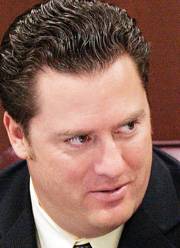Monday, Nov. 23, 2009 | 2 a.m.

Assemblyman John Oceguera, D-Las Vegas
Sun Coverage
Sun Archives
- 2010 shaping up as election year to watch (6-11-2009)
- Assembly speaker post up for grabs in 2011 (5-3-2009)
Beyond the Sun
The tough economy hasn’t prevented at least one elected official from throwing elaborate fundraisers. Assembly Majority Leader John Oceguera has recently hosted campaign contributors in a box at a San Francisco 49ers game (suggested donation: $5,000) and at a wine tasting and dinner at a Napa Valley vineyard ($1,000), setting a new bar for unconventional campaign events hosted by Nevada lawmakers.
The two October gatherings raised eyebrows among some observers, who cited in particular the choice to host events outside the state at a time when Nevada’s economy is suffering.
“The goal for a political fundraiser is to raise money, not to provide entertainment,” said Fred Lokken, a professor at Truckee Meadows Community College. “This just opens the door to a whole host of questions. I don’t see anything good that comes from this.”
Oceguera makes no apologies for the events. In an e-mail, he said he has hosted a variety of campaign gatherings, including some in Nevada that are more accessible to grass-roots activists.
“Campaigns are much more competitive now, and we all have become more innovative,” he wrote.
Fundraising is often the dark underbelly of political life, carrying a stigma even when it’s carried out within the bounds of the law. More than one politician has retired because of the tedium of begging donors to pony up.
Oceguera, who is in line to become the next Assembly speaker, is known as a prodigious fundraiser. And he’s not alone in working outside Nevada.
Other Nevada candidates have hosted fundraisers in New York and California, where many companies doing business in Nevada have headquarters.
Clark County Commissioner Rory Reid, for example, has raised money for his run for governor at out-of-state events with former President Bill Clinton.
But such events are usually held by candidates for statewide or federal office. It’s rare for an assemblyman, even one in a leadership position, to host an out-of-state event, observers said.
Additionally, Oceguera’s recent events defy the convention of holding fundraisers at restaurants or banquet halls. Events he’s held in past years include fundraisers at Blush nightclub at the Wynn, at Red Rock Resort and at the Palms. (The last two events broke an established Democratic practice of avoiding nonunion casinos.)
Oceguera’s advisers say his California events reflect the difficulty candidates are having raising money. Almost all of the state’s largest donors are having a tough time, and fundraisers report that campaign wallets are correspondingly tight.
The political parties, meanwhile, have an unusually large number of seats in play because of term limits that will take effect in 2010. Democrats will lose 10 incumbents, and another five or six seats are competitive in most election cycles, Assembly Democrats say.
Steve Redlinger, a fundraising consultant to Oceguera and the Assembly Democratic caucus, pointed to the major issues — particularly the state budget — that the Legislature will confront next session. For that reason, it’s important to Oceguera that a Democratic majority be retained.
“Candidates are going to have to be creative, think outside the box, in these troubled times to raise the money necessary,” Redlinger said.
The trip to Napa Valley’s Stag’s Leap Wine Cellar was held Oct. 29. His campaign also offered tickets to the 49ers game on Nov. 8, with seats in a private box. Redlinger, in an e-mail obtained by the Sun, requested contributions of $5,000.
In an interview, Redlinger said both events were paid for by private contributors, though he declined to name them. That information will be reported in January, when elected officials are required to disclose their fundraising for the previous year.
Typically, fundraisers are paid for either by the campaign or by a host who donates the food and room space as an in-kind contribution.
Redlinger said, “We don’t view there to be a difference between these events and an event at a ballroom at a hotel on Las Vegas Boulevard, in-kinded by MGM Mirage.”
Oceguera said that at the more traditional event there is less time to interact with donors. “It’s a question of time available. At an event with 100 people, I try to greet everyone and thank them personally within a two-hour period. If I have an event with 10 people for an hour, it stands to reason they will have more time to talk with me.”
Still, some political insiders said corporations are unlikely to donate more to a candidate because of an unusual setting or increased face time. One lobbyist, speaking on the condition of anonymity to preserve relationships with Oceguera, said companies set budgets for fundraising, and fancy events won’t change those budgets.
Some lobbyists who attended Oceguera’s events said they did provide more time with the candidate in a more relaxed atmosphere.
Usually, said Tom Clark, a lobbyist for the firm Holland & Hart, “you have five minutes with a legislator, eat rubber chicken and go home after half an hour.”
Clark, who attended an Oceguera fundraiser at a recent Reno Aces minor league baseball game, said, “We’re in a down economy, yet candidates still have to raise a tremendous amount of money. I think doing nontraditional types of events will become more popular.”

Join the Discussion:
Check this out for a full explanation of our conversion to the LiveFyre commenting system and instructions on how to sign up for an account.
Full comments policy